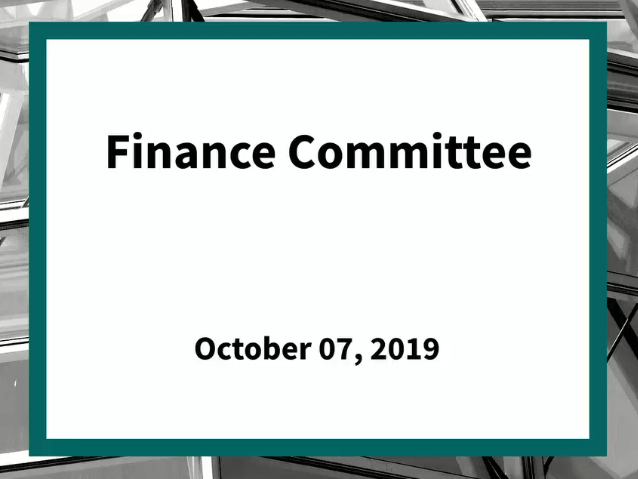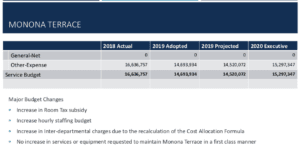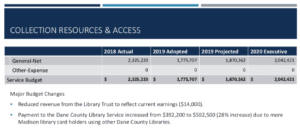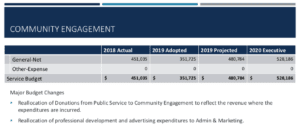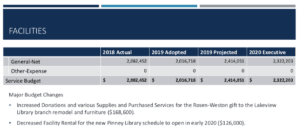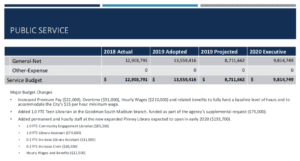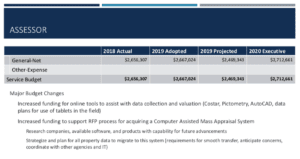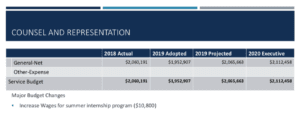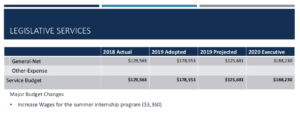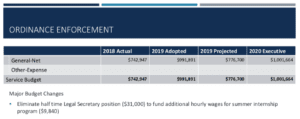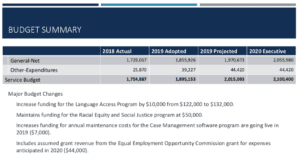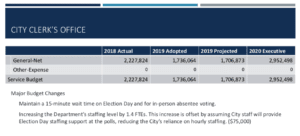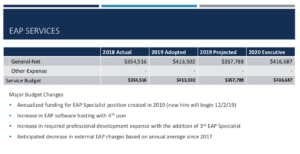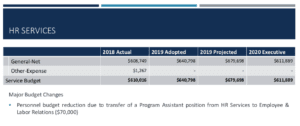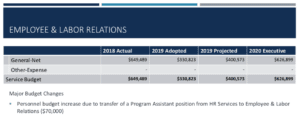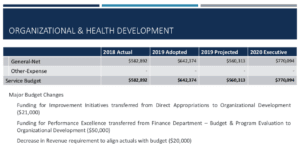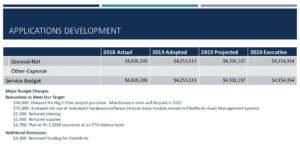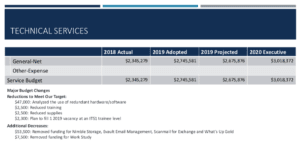These are the presentations from Monona Terrace, Library, Administration Agencies (Assessor, Attorney, Civil Rights, Clerk, Employee Assistance Program, Human Resources, IT and Finance)
I blogged the non-budget part of the meeting. This is the public testimony and overview by the Finance Department. This is the third blog about the first night of budget. Here’s the agenda, the budget, the hearing schedule, the overview, and presentation slides from day one and day two.
Monona Terrace
Presentation
Greg McManners reminds them this is an enterprise agency. The expenses are supported by operating revenues and room taxes. They don’t have any general fund expenditures. Their budget is pretty benign, hasn’t changed much from 2019. Biggest obstacle is the increase in payroll costs which is about $175,000 and the recalculation of the cost allocation system which increases their costs to operate by $68,000. That happened after they submitted their budget and after the room tax commission met. To balance the budget the Finance Department is suggesting they take $175,000 out of their reserve. They have an operating revenue source out of their reserves of $221,000 allocated in 2020. They have no other increases in services or costs.
Questions
None. But they congratulate him on his final budget and applaud.
Library
Presentation
Greg Mickells Library Director and Chrissy Wick, the Director of Public Service.
This is a new category in the 2020 budget. This separates debt service, $2.8 is debt service.
This is a slight reduced revenue from the trust of $14,000. It is a annual draw to support the collection budget. They also had a significant increase to support the Dane County Library Service, it went from $392,000 to over $500,000. That is a service that if you use your Madison Library Card at Middleton or Monona, we get charged back for that. He says if you use your library card, use it at a Madison Library.
This was a reallocation of a lot of funds, donations from public service to community engagement. An example is that the Schmidt(sp?) Futures grant was under community engagement and it had previously been under public service. They are trying to realign their revenue items to the correct expenditures. They did get an extension on that grant to extend it to 2020.
He says this is a happy story. There are additional money’s coming from the Estate of Cheryl Rosen-Weston that will be able to do a remodel and they are looking at $168,000 going towards that project. Also, when they are moving in to the Pinney Library they will have a significant savings because they won’t have to pay rent and they will have utility savings with the (geothermal field?) and LED lighting, even tho they are doubling the size of the facility, they will see minimally a 6% savings.
They have slight increases to cover their premium pay. That is the pay they pay for staff on evenings and Saturday. The overtime pay is for Sunday hours. Hourly wages they were made whole. They were behind on that and they have corrected that to balance that. They will be paying the city’s $15 minimum wage. He applauds that move by the city. As far as the library goes they are supporting about 150 in that area, so it is significant for the library staff to have access to that minimum wage. In addition they will be adding a teen librarian at Goodman South, they greatly appreciate that support. They just did a major renovation of the Goodman South library and the increase in teen usage of that facility really demands us to be offer to more structure, more programming. In March of 2020 Pinney will be coming on line and the increase in staffing is because the facility will double in size from the previous library and put them on par for the same staffing levels as Sequoia Library.
Questions
Keith Furman asks about the cost of people going to other Dane County Libraries and how its increasing, he asks if they can explore educating people because he thinks they have no idea that is what happens. Have other places around the county had success with education or know why people are doing it? Mickells says that it is kind of an unspoken rule with libraries that you don’t push people to one library or another. He says that he thinks what is driving it is population location. He says they are responsible for 50% of the circulation at Verona Library. Our Madison residents using that library. A lot of it has to do with the growth of Madison in that area. They just see Verona as the closest and most convenient library. There are trade-offs. Even tho we are looking at half a million dollars could we create a facility to support that population for that amount of money? The same goes for Middleton. About 30% of Middleton’s circulation is by Madison’s resident. Even tho there are adjacencies with Ashman Library it comes down to convenience. He says people say “oh, I was just at your Middleton branch today” and he says that’s great, we’re glad to hear they are using the library, then explains it is not a Madison Library. It does get competitive sometimes between the libraries, but he values people using public libraries and having this collaborative/reciprocal borrowing in 7 counties the advantages far outweigh it. They can’t build a library for that amount of money.
Barbara McKinney says that when this was brought up in the Library Board meeting one of the board members now takes her granddaughter to a library that is now in “Dane County”. She asks about the general education, she knows it gets competitive but that fact that there is a 28% increase that is not insignificant. Has there been a thought of gently educating residents that if they are going to check out a book use “Dane County” library. Has that ever come up as a conversation of gentle education. Mickells says they could approach that, to have that out there. He says that one area that might be more productive is talking to the Dane County Library System and they are the ones that operate the formula and distribution of state funds. What he wants to modify a formula developed over 40 years ago. When circulation was all libraries did and from an equity perspective he says a lot of his costs go toward services, programming and although circulation is a huge part of the service model, its still a major core service they have. But they invest heavily to provide services and he wasn’t that calculated in the distribution of aid instead of where the book gets checked out from. They have started discussion and are hoping to pursue that and putting together a task force to see if they can re-examine that. It won’t be popular with the libraries that receive funding from this formula. In the past Madison profited very well from this formula. Sometimes we received about $600,000, about 10 years ago. But that was before Fitchburg, Verona, Middleton and Sun Prairie libraries were built. Education could be an element but he thinks it would be more productive trying to get the formula adjusted.
Mike Verveer asks about cost sharing for the Bookmobile. Is that agreement indefinite like the previous formula. Or is that a three year agreement and something that will be renegotiated. Wick says that the terms of the MOU are that they can revisit it every year if need be. Right now it has a 3 year term because it is linked to grants we have to fund the operations. So, once that grant funding runs out we will discuss again. Right now Dane County is paying 25% and we’re paying 75% and even tho we are using the Dane County collection, Madison is getting all the collection numbers, so we are not hurting ourselves.
Verveer asks about page 192, and the library fine revenue. He tries to read the agendas, minutes and reports on the Library Board and he says that there is a trend nationally about reducing library fines. He knows the trend is going down, but can you update us on this and are you confident you won’t have a shortfall in the coming year if we adopt the budget with $250,000 in fines. Mickells says there is a national trend in fines being reduced. He says that a lot of libraries are eliminate fines altogether, but they are challenged with how do they replace the revenue. Even tho it is declining, it is still a significant amount. They are getting better at getting people to renew their materials and receive notices that it is overdue. Circulation is slightly declining as well. They are seeing the largest increase is in digital content and that doesn’t become overdue or generate a fine or lost revenue. It’s a combination of factors.
Veveer asks about the board policies and if he is confident that they will collect the amount in the budget. Mickells says yes, they’ve been tracking it closer, and they are fairly confident they have a good number to go by. Wick says that while fines are going down, the lost and replacement fees have gone up some. So this year it will still be neutral to hit the budget target.
Administration Agencies
Assessor
Presentation
Michelle Drea says that this is a cost to continue budget, they have a small amount allocated to assist in the acquisition of computer assisted mass appraisal. They are in their RFP year and they have to do legwork to make sure they are getting a great product. They have an outdated system that is moving to a new technology and they need to do a self evaluation of the data and figure out how they want it to migrate.
Discussion
Verveer asks about staffing positions and the reorganization. She says they are in the process of hiring their final 2 appraiser 1 positions. As a result of the reorg they were able to grow the front-line staff by two. She is at the end of the first round of interviews and used a robust RESJI tool and it was very successful. Their prior recruitment resulted in 18 applicants and this one had 57. The state is looking at using their approach as a template for recruitment for appraiser positions. HR was a good partner in the process. She hopes to have recommendations by October 15th and then they will be fully staffed, but they have some retirements coming, one is significant that they will have to plan for.
Verveer asks about the consulting services to ensure the assessments are equitable, especially commercial vs. residential. What are the consulting services on the bottom of page 33. Is this like the high profile consulting we have done in prior years, or is this something more mundane. Drea says “both”. She says part of it is the on-line software (pectometry?) and a consulting contract that represents the (Cama?) bump for the 2020 request. The 2019 projected is the sales ratio study and the contract just got finalized that Friday and they are providing the date this week and should have results in a month or so.
Verveer asks about the study, what does it do? Drea says its a sales ratio study that is done every year by the State Department of Revenue, looking at the sales and conducts a statistical study to make sure our ratio is as close to 100% as possible. If you are 90% or lower then they come in and do your assessments for you. They have always hit 95% or more, they are one of the best sales ratios in the state. That reflects that our assessments are accurate and we are doing our jobs well. This is a proivate study through the International Association of Assessing Officers using the same data and similar processes. They are happy to improve and learn from it.
Donna Moreland asks about the 2019 adopted and projected change for work supplies. In 2020 it goes back down. Drea says that is where the change detection software acquisition was. So, that is still being evaluated as a tool. They have had obstacles with data collection in terms of inspecting homes and getting into back yards. There is a recent Supreme Court case that holds them subject to the 4th amendment, the warrant requirement, but that puts obstacles in the way of people going into back yards. They can’t rely on their trespass ordinance any more. So they are looking at some viable on-line applications to see what they can do in terms of accessing data. They have acquired a change detection software that takes orthographic images from 2 years and highlights where there is a change in the building outline. That can lead to a revenue increase, helps her prioritize where they are going to look in terms of inspections and who they want to ask first. She says that work supply line item is the initial acquisition of that project. If they continue with that the cost goes significantly down and it will rest in a different line item.
Attorney
Sandwiches and cookies have arrived for the alders! So announces Alder Bidar.
Presentation
City Attorney Mike May starts out with a quick overview, its a cost to continue budget. The increases are the wage increases for employees. Their budget is very heavy on wages, there is only one other major change. They are eliminating a half time secretarial position that they haven’t filled in a couple of years and have finally determined they will not need to fill it. They are taking that money to put in hourly wages to expand the law clerk program. It’s been one of the most successful programs, they have been over budget on that the last few years, so they decided to put more money in it and continue to expand it.
This is all the work they do advising departments, council, mayor, HR, public records. That is about 2/3 of their entire budget. They have an allocated portion for the summer internship program. At the end it is balanced by the decreese of the other position.
This is the work of Diane Althouse interns of drafting ordinances, maintaining the muni code that they have and anything else related to legislation their office does, besides interpretation which they keep in counseling.
This is the municipal court work prosecuting the ordinance violations. This is where the legal secretary elimination is.
Discussion
Verveer asks about the summer law clerks, on page 41 is he reading that the hourly wages is the total, does it all go to law clerks? Yes. So its $100,000? May says its going up to $100,000 from $25,000. He says he thought it was going up by about $24,000 so he’s not sure how it got up there. They both seem confused. Verveer says that for $100,000 that would be a lot of law clerks and they wouldn’t have seats for all of them. May says it could be cuz of the $44,000 that is being eliminated, but he has to ask staff. David Schmiedicke says it includes the fringe benefits, they were trying to “true up” the benefits for hourlies, so that is included there as well. Verveer asks how many bodies it would be. May says that they normally have three, one of them is through the prosecution project, they used to just come for the summer now they tend to stay all year, so they have to switch them from a stipend to hourly wages starting in September. This year they told the people they were limiting them to 10 hours a week. He says they will have 3 and he wants to fund them at, at least 15 hours a week. And they would also like to add another person, he doesn’t know if they will get up to $99,000 but it will be more than in the past by at least 1/3 or more.
Verveer asks about the resolution to authorize UW Police Department citations in certain categories. That will be deposited in Municipal Court for the first time ever and prosecuted by your employees. Verveer asks if he is comfortable with the MOU that has been circulated and being able to absorb the additional work load. He says yes, they are short one prosecutorial position right now and he’d like to get it filled before they get too much of that work. They don’t think it is as big of an increase as they had originally anticipated. It’s also on a pilot basis and if they get into it and find out its not working they will have to re-evaluate or look at if they are recouping enough costs to cover it.
Civil Rights
Presentation
Norm Davis says that they have a cost to continue budget, but there are some net changes. He is appreciative of the $10,000 for the language access program. He says its really important because although the council has provide $122,000 for the last couple years for translation and interpreting services, they are always exhausting that budget and they know that they will have additional demand with the 2020 census. He says the budget maintains funding for the Racial Equity and Social Justice Program. In addition to the equity coordinator position and the assistant position, the $50,000 has been and continues to be allocated for additional training for the various services and professional development that is funded through the department. They support other departments that might not have training and professional development budgets, so they can participate in the trainings and conferences (Belonging, Race Forward and YWCA Racial Justice Summit) Also they have $7,000 for maintenance of the new case management system for the Equal Opportunities Division that is 30 years old. They partnered with the City Attorney’s office and found something that works for both of them. They also had a slight increase in the grant from the federal equal employment opportunities commission. They do contract work for the federal government and because they had increased capacity to get credible cases done for the EEOC they were able to get an additional $4,000. They have 4 work areas but one service, and that is just over $2.1M. The department work areas are Racial Equity and Social Justice, Affirmative Action, Equal Opportunity and Disability Rights and Services programs.
Questions
Shiva Bidar asks about the RESJ program. She understands the Equity Coordinator, but what does the $50,000 cover? Davis says opportunities for professional development. They have action teams (tools and training, strategy team, community connections, co-leads team) and they also have facilitators and trainers. They need to make sure they shape the saw, the $50,000 allows people to attend the conferences. The Government Alliance on Race and Equity Alliance is $3,000. And then there are opportunities outside of Madison, typically outside of WI where they are sending not just Civil Rights staff but equity team members to training opportunities – to present or learn. It also goes to support trainings here for our staff or elected officials.
McKinney asks about if they are fully staffed. And also how is the work of the program moving forward. Davis says that they are fully staffed except for the Racial Equity Coordinator position. Because of constraints they are not able to fill the position until 2020. They expect to move forward filling the position and in the mean time they are working with the other staff team members. When there is need for technical assistance or a RESJI analysis, the requests are triaged and someone on the teams assist the departments. The training program is coordinating the trainings, they are very popular and fill up in a week. They have team members who conduct the trainings and the department supports them. The work does continue to move forward. They have a lecture series they do each month, the just re-initiated the core team, its all the people doing the racial equity work and includes all staff and the committee members. They just did a kick off of the team and there is a buzz and excitement about the initiative.
McKinney says that the people on the teams are taking on additional responsibilities, do they need to go through the department heads to get that release time, how is that working? Is there a back log, you mentioned triage, how is that process going? You say more about the new energy. Davis says there are more staff members joining the team. Even as some members that have been on teams are transitioning off due to work demand, they are finding replacements. The work is being baked in through a couple measures, one is the equitable workforce plan. Departments must conduct three equity impact analysis a year. That means they need and equity team in their department. And they also support them through the civil rights coordinators. They get technical assistance from the other teams, either training for staff . . . They have a new one hour training because many city employees don’t work first shift and can’t make the trainings, 100s of field staff will be trained by the end of the year. The work is spread out throughout the city in addition to the coordinator and support staff. The departments see value and are reaping the benefits because they need to be accountable for how they are reaching racial equity in their departments.
McKinney asks about the wheel tax and if the RESJI was applied, if that landed in your department would you be able to staff that? When you are triaging, how does that look. Davis says the put out a call to all the teams. They like the department sponsoring the analysis is equipped to facilitate the analysis and the teams provide technical assistance. He says the only way to make RESJ mainstream and not on the side is by having it cascaded through all the departments. It’s their job to make sure they are training and educated and know how to use the tools.
McKinney asks if he feels that this is moving strategically and expeditiously through departments and you’re getting buy-in and support? Davis says yes, they are in the midst of updating their 5 year plan from 2014. Some of the teams are looking at what has been accomplished, what needs to be done and what new priorities have been identified through retreats and meetings. They are working on the 2020-2024 plan.
Verveer asks about the $100,000 organizational study of DCR they discussed last year and that it wasn’t appropriated but you would find funds for consultants and use UW grad students to put together the same information. Was that accomplished this year? Davis says that even tho the money was not approved, he felt it was very important that they look internally to maintain or improve the culture of the department. The department had been through a lot of changes and had a lot of impacts. He wanted to make sure that they had a solid foundation to go in the right direction. They have been working on their communication plan for quite some time. He and the former director discussed that they do a lot of good work and yet a lot of people don’t know there is a Department of Civil Rights. They want to get the message out. They hired one consultant to work with the leadership team to determine who the DCR is and to start to shape the internal and external narrative. That was about $6,000. They also had a consultant do a cultural analysis for $8500. That was one-on-one interviews with each employee, a closed survey for the employees to rate the department in leadership, trust, problem solving, etc. After they did the analysis he was proud that they scored excellent to very good in each category. There were a couple of areas where they didn’t score in the highest, but we never scored in the lower category. One was problem solving, he attributed that to some of the challenges the department had been facing. Overall the scores were very good and they are following up on that study and are working to improve the department.
Verveer asks if everything that was in the $100,000 study proposal has been done? Or are there still areas that he would like to conduct studies of. Davis says he thinks they accomplished this with $15,000. He thinks the quality of the consultants was good and they were able to work within the scope of the project and he doesn’t see a need for further study. He says something in a couple years would be good since they have a benchmark now.
McKinney asks where this body of work is? What is the document or body of work? Because your department is a critical lynchpin it is critical your department reach those benchmarks but where is the body of work that supports that? Davis says the report was given to him and the staff. Once the report was completed it was also given to Human Resources and he thinks the previous mayor’s office. He says this is one of the only instance where imperial data was developed around agency culture, beside in the employee voices part of Performance Excellence.
McKinney asks if the report can be supplied or furnished to alders? She is wondering why if it came up during finance and was a lengthy discussion, why wasn’t it part of documents we received, is there a reason? Davis says because the council chose not to fund the study, but the department chose to move forward with a more limited study.
McKinney asks if it is in order to request this body of work? Davis says you certainly may. McKinney says she requests it.
Mayor Satya Rhodes Conway reminds them that they are hear to talk about the 2020 budget and that you all have access to all the department heads on a regular basis for other types of questions.
Alder Grant Foster clarifies that it says there was a $10,000 increase from $122,000 to $132,000 but that is not what is showing in the line item detail. Seems like others noticed too. Schmiedicke says “we’ll be fixing that”
Donna Moreland asks if with the fix it is a $10,000 increase? Schmiedicke says yes.
Clerk
Presentation
Mary Witzel-Behl says that they ask to support the Mayor budget for the office. It creates critical funding for additional staff. They have been understaffed for years and when they are administering elections on 2-4 hours of sleep it really is a disservice to our voters, we make more mistakes and each vote at election time could end up denying someone the right to vote. It isn’t that we need staff at election time, even in odd number years where you’d think that we have plenty of spare time, she is still covering, as a department head, phones and counter and she has only had time to schedule one hair cut this year and ideally it should be every month. They are critically understaffed in odd number years too. In addition to the increase in staff, the polling place staffing was based on more data than ever before. A few years ago they had UW people at polling places time lines at the polling places along with data from across the country by MIT to determine how many poll workers you need and splits in the poll book to meet the goals about how long people stand in line. She says the standard in Madison is that they don’t want people to not wait more than 15 minutes. It’s been a guess in the past, but now they can use the data polling place by polling place. That did end up saving some funding.
Questions
Verveer asks about the .5 FTE that was never filled being increased to .6 FTE so they could access benefits. Has that been filled or is that vacant? She says it was vacant for many years because it was used to meet the salary savings and they have had so much turn over that they quickly met their salary savings and had a once in a life time opportunity to fill the position.
Verveer asks if the incumbent is seeking to go to the full time position. Witzel-Behl says they hired 2 full-time positions earlier in the year and when the council increased the position they used the same list from when the full-time position was filled and the incumbent is excited about working full time.
Verveer says that when he mentioned the additional funding he said Jim Verbick said they would make all that up by having city staff work on election day. It even says in the budget that it assumes city staff will provide election day staff coverage at the polls. Verveer asks for details and are you optimistic that more city employees will participate than they have in the past. There has even been a line item for several years for election voting in every agency. Witzel-Behl says it is something they have suggested for probably a decade, in the past the clerk’s office was told, go ahead and try to recruit if you like, but until this year we didn’t have the backing of a mayor to encourage city employees to work at the polls on city time. And there are some real benefits to that. First of all election work is equity work and if they get people on the equity team and civil rights coordinators to work at the polls that will give them some good real life experience out in the city of Madison working with individuals outside of their bureaucratic city agency environments. Additionally, at the polling places, because of the size the clerk can’t be at every polling place, instead we are in the office troubleshooting over the phone. There are things we don’t hear until after election day and we wish we had known so we could have addressed an issue that came up at the poll. Inappropriate things being said, maybe some micro-aggressions. Especially as we are trying to recruit a more diverse group of poll workers, we want to make sure that the environment and culture at each polling place isn’t driving people away from returning as a poll worker. It would be really helpful if we had people at the polling places that were trained in equity and micro-aggressions and bias and inclusion and could speak up if there was anything inappropriate going on.
He says that in every budget he found the line item about having staff work at the polls. He says he heard from a person active in the League of Women Voters’ Leadership that they had volunteers ready willing and able to help with various aspects of the elections but you felt more comfortable having hourlies perform the work. Witzel-Behl says that was issuing absentee ballots at the libraries. Verveer asks if that includes nursing homes. She says that would be election officials who are hired to deliver the absentee ballots. She says there is a certain level of training that is required and especially at the libraries they need to make sure that they are issuing ballots in the state ballot registration system. In 2016 they tried to recruit volunteers for the libraries and process everything in the clerks office at the end of the each day and with over 50,000 absentee ballots it almost killed us. They found its hard for volunteers to grasp if someone lives in the City of Madison. If the voter says they live in Fitchburg, a lot of people assume that is Madison. Then they’d have a ballot from someone in Fitchburg and can’t honor it and have to track them down to tell them to go to Fitchburg to vote. They are hiring through Human Resources people to issue ballots at the libraries using the state system which will not allow them to issue ballots to people from the other surrounding municipalities.
Verveer asks if people could volunteer through the League or otherwise as a way to save money. He says some people volunteer and choose not to be paid. Witzel-Behl says they tried it and it was an administrative nightmare. When you are paid to show up at the library for a certain shift we find you’re more likely to show up, but if you sign up as a volunteer often we get a last minute cancellation and then that leaves the library with no one issuing absentee ballots.
Verveer asks about in person absentee voting would be the same as they have been accustomed to given he District Court ruling and that as soon as the county provides you the ballots you will open your doors to the registered voters. Is that correct. Witzel-Behl says yes, in the clerk’s office and then we have to make sure to have time to fully train the hourly employees working at the libraries, so they wait a little bit in case there is a problem with printing ballots and the equipment. We don’t want to end up with a delay and have to explain. When they start issuing absentee ballots in the clerk’s office first we can have our newer hourly employees shadow us and get hands on training and after that they are on their own and they can only troubleshoot over the phone.
Verveer asks about the cybersecurity grants to municipal clerks, are we eligible for that or is our cybersecurity so advanced that we wouldn’t be eligible. Witzel-Behl says ours is way beyond most municipalities. There are a lot of municipalities that are operating on microsoft platforms that are not supported any more and that is why they created the grant. They are looking to see if there is anything else that might apply in the grant. There is also a doubt that if its a competitive grant we wouldn’t get it because we are so advanced.
Verveer asks about operators licenses that are up next year. He says its $100,000 in revenue. Are operator license renewals so routine that the vast majority are done on-line with not a lot of effort by the staff, or is that not the case and we should look at increasing the fees. Witzel-Behl says they have to re-set passwords but it doesn’t take much time. Verveer says its not an extra workload. She says its a lot easier than when they renewed every year.
Bidar says that she will be brining forward an amendment for the special election in district 8 in 2020. Could you mention your cost assessment for that. Witzel-Behl says she talked to the county clerk and his estimate is $30,000, if there is a primary and an election.
Donna Moreland asks about the delivery freight charges, the projected for 2019 is $17,000, the request is $45,000 for 2020. Witzel-Behl says there are more elections in 2020 than 2019 and that increases the delivery costs. The deliveries are the absentee ballots to polling places on election day and a week before the election a moving company moves the tabulators and voting booths and election signage to each polling place and then they help us retrieve it right after election day.
Moreland asks about the rental of equipment. Witzel-Behl says its actually purchase of equipment and she doesn’t know why the line says rental. That is the purchase of 25 additional machines that are touch screens that are accessible voting devices. They are a big fancy pen that marks your ballot for you, they don’t county anything, and you feed the ballot into the tabulator to be counted.
Employee Assistance Program
Presentation
Theresa Martinez is there with Sherry Amos who is the program assistance and budget contact and she answers the phones. They have very few changes. They were given a full time EAP specialist position in this year’s budget but she wasn’t able to start until December and they had cost savings. The slight changes in the budget are due to that hire. They will have additional costs for professional development from having a third certified master’s level clinical social worker in the program. They will also have some slight increases in the EAP software hosting, cell phone, professional association fees, the rent has gone up and professional development required for certifications. They have a dual model employee assistance program – its internal and external. They have professional staff and they contract out for our 24/7 coverage and when they need to draw trauma experts, couple counselors and some areas of specialties where they need to supplement the program. As well as some of the workplace services they provide – conflict resolution, workgroup intervention, etc. They have a slight decrease in external EAP charges based on annual average since 2019 and they brought it down a little by taking more of it on internally. That is the money they have if there is a large scale critical incident and they don’t always have full control over that, because city managers and employees and family members can access those services without going through our program, so they don’t always have full control over what those costs are going to be. They used that to cover some of the costs of the new position.
Discussion
None
Human Resources
Presentation
Harper Donohue, the Director of HR says they have three different service areas.
He says they are responsible for administering exams, testing, recruitment and selection process and also providing general HR services to the city and applicants. They have a reduction due to the transfer of a PA position that was originally in HR services but it doing work out of Labor Relations.
This area has a gain of $70,000 due to moving the PA from HR Services.
There are quite a few changes here, $21,000 is being added due to direct appropriations to support leadership development and improvement initiatives. There was also funding previously in the finance budget $50,000 which is now being housed for the Performance Execellence work. There is a decrease in revenue that they were required to generate when they put on seminars. There was a change in eliminating their ability to charge city agencies, which he thinks it fantastic. It’s aligned with their goals to make sure that the charges are not a barrier to supervisors allowing staff to attend. The reduction in $20,000 takes pressure off OD.
Discussion
I don’t know what got said, but the Mayor says that “as the night goes on finance staff gets snarkier.”
No questions.
Information Technology
Presentation
Sarah Edgerton the IT Director has Amanda Lythjohan who is the administrative services manager.
Edgerton says that they are reworking their budget. They broke their capital budget into projects and they will do that in 2021 for the operating budget. She says for budget alignment they moved $500,000 from applications and development and moved it into technical services where it needed to be. Another major change was that they had $258,000 that they needed to find before they even hit their target. $170,000 was added software and hardware maintenance that came from capital projects from previous years as well as the 7% increase in maintenance they have every year and that was $88,000 in applications and in technical services.
To address the reductions they delayed the Digiplan to do online signatures. They will implement that in 2020 so maintenance is in 2021. They also did analysis of redundant hardware and software and they found the Citiworks asset management system they brought in in 2019 meant they had not need for Accela Asset Management module which is basically the same thing. But they still had two agencies using Accela to get them moved to Citiworks and they will save $75,000. They also reduced training by $2500 which is not great for IT, reduced supplies $2500 and also filled two vacancies they have in 2019 and ITS-1 trainee level, to get the cost savings. With additional decreases they are also removing funding for EventBrite, they already have a legacy system they can use and they will come back in 2021 and ask for that money again.
They analyzed hardware and software here and were able to reduce some around security software. They also reduced training by $2,500 and supplies at $2,500. And one of their vacancies will be filled as an ITS-1 trainee. For additional decreases they removed $53,000 for Nimble Storage, E-vault, Scan mail for exchange in What’s Up Gold, they have other systems in place to handle this and will do some purchasing in 2019 so they can handle some of that instead of doing it in 2020. They are also removing work-study for $7,500 which was for the media team.
Discussion
McKinney asks about reducing the training. What is reduced. Edgerton says IT professionals are continuously sending staff to training to keep them current. An average training is $1200-1500 per person. And we send people to conferences. They had every team propose what conferences they wanted to go to and looked at conferences that were closer to Madison so we weren’t paying for flights, many hotel nights and those are the conferences staff will be going to this year. They are also sending one person to a training and have them come back and share that training. Another thing they are doing with some of the capital projects they are building in as part of the procurement that there is training as well.
McKinney says that you’ve compensated so it doesn’t impact the overall efficiency of the department? Edgerton says yes, they can do that for this year.
Question was asked off mic I didn’t hear. Edgerton says that the PI position is still in their budget, so that shows $53,000. It’s actually going to be moving, she is not sure where, so they are not accounting for that position, so they have 52 staff.
Verveer says he wasn’t going to ask about PIO, from which I deduced they were talking about the Public Information Officer. Instead he asks about the media team. He asks about page 167 that says there is an additional $100,000 of interdepartmental billing and I presume its all from the summary Central Services cost allocation plan. With all the podcasts does IT have separate inter-departmental billings to say engineering utilities for the podcasts. Can you explain how you decide which agencies you bill and which you don’t or is it part of the cost allocation. Lythjohan says they are not part of the cost allocation, which charges for everything except the media team. She says they charge the enterprise agencies back. If they are not enterprise they don’t charge for the work to record. They have worked with outside entities as well and have some revenue from that. Dane County Board is another one that they do productions for. A couple others were added this year too, Metropolitan Sewer District will be covered.
Verveer asks about the Sewer and Stormwater Utility Podcast, couldn’t you bill something for that, or are podcasts like zero expenses. Staff say that is an interesting through and they will ask their budget analyst. Verveer asks if he is reading the right line item “inter-department billings” that’s all the cost allocation, so its really “inter-department charges” is that the right line? Like for Monona Terrace. They say its the billing line item.
Moreland is asking a question (again partially off mic) about a supervisor position for $74,000, where they requested $89,000 which is a significant increase but the recommendation is $93,000. Is it a different person? Schmidicke says that it will include the 3.25% pay increase that was not in the agency request numbers. Moreland asks about the huge increase from $74,000 in 2019 to $89,000. Schmidicke says it could be a partial year for that or a re-class or where they were hired compared to what was budgeted in 2018. Edgerton says it was a reclassification.
They skip finance and move on . . . to what will be the final and fourth blog on this 6 hour meeting . . . but not til tomorrow!

